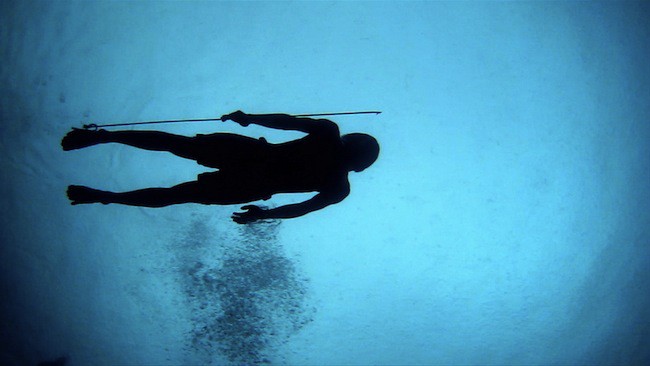Olivia Wyatt is a filmmaker and photographer based in Los Angeles. She is a member of the Sublime Frequencies film and music collective. Her first feature, “Staring Into the Sun,” is about tribal music and culture in Ethiopia. Her films have screened everywhere from the Barbican Museum in London to the Museum of Jurassic Technology in Los Angeles. (Press materials)
“Sailing A Sinking Sea” will premiere at the 2015 BFI London Film Festival on October 10.
W&H: Please give us your description of the film playing.
OW: “Sailing A Sinking Sea” is a feature-length experimental documentary exploring the mythology of a seafaring nomadic tribe in Thailand and Myanmar called the Moken. The Moken live scattered throughout the Andaman Sea and the Mergui Archipelago on islands and tiny, handmade wooden boats. As a viewer, you will swim under the sea past fish and mermaids, sail boats across turquoise waters, land on 13 different islands, step inside sea shanties on stilts, delve into the minds of shamans, become possessed through the worship of sea gods, dance between lovers and emerge drenched in Moken mythology.
W&H: What drew you to this story?
OW: I first read about the Moken after the Indian Ocean earthquake and the 2004 tsunami. I was fascinated to learn that the Moken predicted and survived this devastating event that took everyone else in the region by surprise. The Moken on land climbed to higher land and the Moken at sea sailed to deeper waters. Meteorologists were unable to predict the tsunami because they did not have tidal or other sensors in place, but the Moken survived because of their symbiotic relationship to the sea. They survived because their ancestors told them through stories and songs to expect a tsunami and what to do when it arrives. They survived because of their mythology, and they survived because of the dreams of their shamans.
I kept thinking about the Moken through the years and from time to time would look into how they were doing through any articles I could get my hands on. I noticed that their population was on a decline; they were starting to live less nomadically and governmental and non-governmental organizations were altering their existence in subtle and not-so-subtle ways. I knew that soon their culture might get entirely engulfed, or at the very least watered down by modernity. It was then that I decided to make a film that helped to preserve their culture, their mythology and their music.
W&H: What was the biggest challenge in making the film?
OW: Shooting underwater. I love scuba diving, but adding a camera to my hand while doing so felt very unnatural. Also, all of the translations. It took a total of about 15 people to translate for the film. This number includes both field translators and translators during post.
W&H: What do you want people to think about when they are leaving the theater?
OW: I want people to leave feeling as though they just flew to Thailand, hopped on a boat and explored Moken islands all the way up into Myanmar on their own. I want them to leave feeling light and with a strong desire to preserve indigenous communities and the beauty and knowledge found within them. I also hope they leave with a heavy feeling in a part of their heart for the current state of the world’s oceans, due to both global warming and commercial fishing.
W&H: What advice do you have for other female directors?
OW: If you have a dream, chase it into reality!
W&H: What’s the biggest misconception about you and your work?
OW: I often hear people say, “Oh, you must be so brave in order to do the work you do and travel to all of the places you travel.” But the truth is, I don’t think I am braver than anyone else; I just think my desire to create is stronger than any fear I have, and I am willing to make lots of sacrifices in order to satiate it.
W&H: How did you get your film funded? Share some insights into how you got the film made.
OW: It all started with my dear friend, Will Oldham, AKA Bonnie “Prince” Billy, believing in my film. I had just been to visit him and shared with him the story of the Moken and the film I wanted to create. Less than a week later, I lost almost everything I owned in Hurricane Sandy. Will then asked if he could hop on board as an executive producer for the Moken film. He is the only reason I was able to replace all of the equipment I lost and make it over to Thailand to create the film.
When I returned to the States, I did a Kickstarter to help with some of the post costs. Through Kickstarter, I met Jefferson Holt, who donated a generous amount and came on board as co-executive producer via his company Daniel 13 Productions. I was then approached by one of my favorite ethnographic filmmakers, Robert Gardner, who had just seen my previous two films and asked if he could fund whatever I did next.
Gardner made a donation to “Sailing A Sinking Sea” through his organization Studio 7 Arts. (I dedicated this film to Gardner, and I am sad to share that he passed away just last summer.) Once the film got accepted to SXSW, I was able to receive final post costs from RYOT Films.
W&H: Name your favorite woman-directed film and why.
OW: It is challenging for me to pinpoint my favorite film by her, but I love Maya Deren. I love everything from her anthropological work in Haiti, “Divine Horseman: The Living Gods of Haiti,” to her experimental work, such as “Meshes in the Afternoon.”






